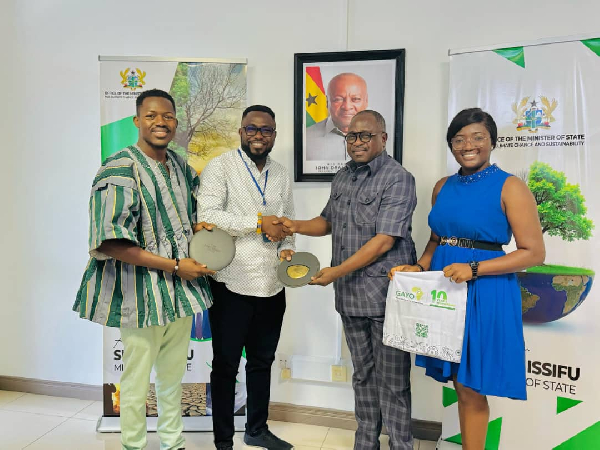GAYO launches period health empowerment guide to promote menstrual dignity and climate awareness
The launch, which took place at GNAT Hall in Bolgatanga last Thursday, formed part of this year’s Menstrual Hygiene Day celebrations.
The event was co-organised by GAYO and SHARE Project partners—WaterAid Ghana, FAWE, Right To Play, and FHI360—under the theme: “Menstrual Health and Climate Action: Making the Pad Policy Work for Every Girl.” It brought together key regional stakeholders, including the Ghana Health Service, Ghana Education Service, Department of Gender, traditional leaders, district assemblies, educators, students, and youth from various communities.
Speaking on behalf of GAYO’s Executive Director, Richard Matey, GAYO’s Project Coordinator, Benedict Fosu Arthur, described the guide as a “portable revolution” that gives every young person the clarity and confidence to understand their body and manage menstruation with dignity.
“We launch not just a guide, but a declaration that every girl, whether in Bolga or Bongo, Tamale or Tumu, has the right to know her body, understand her cycle, and walk in dignity,” he said.
Developed by GAYO in collaboration with the Ghana Health Service, and with input from the Alliance for Reproductive Health Rights, the PHEG offers a compact, user-friendly reference adaptable for diverse communities. It addresses the physical, emotional, and hygienic aspects of menstrual and sexual health. The guide also includes information on climate change, its relationship with menstruation, and environmentally responsible disposal practices.
In partnership with the Ghana Education Service (GES), GAYO has expanded its Menstrual Hygiene Management (MHM) education initiative from three schools to nine junior high schools in the Kassena Nankana West District of the Upper East Region. The initiative, focused on MHM and climate education, has reached over 1,000 students—including boys—through youth-led peer education sessions.
These sessions were facilitated by trained community youth under GAYO’s Adaptation and Resilience Project, ensuring both sustainability and local relevance. The approach promotes openness, reduces stigma, and fosters collective responsibility for menstrual dignity in schools—all in alignment with GES-approved educational content.
The Menstrual Hygiene Day event also served as a platform for critical discussions on the need for equitable and transparent implementation of Ghana’s Free Sanitary Pad Initiative. Participants raised concerns about the environmental impact of single-use menstrual products and called for greater investment in WASH (Water, Sanitation, and Hygiene) infrastructure in schools.
Through its integrated approach combining menstrual health education, water access solutions, and climate-smart livelihoods, GAYO continues to bridge the gap between policy and practice—ensuring that no girl is left behind due to menstruation or climate vulnerability.
The Period Health Empowerment Guide will be made widely available and is intended for use in homes, schools, clinics, and safe spaces where young people and caregivers seek support and guidance.
“Pads without knowledge are like roads without direction,” Benedict added. “Let this guide be that compass—not just for Ghana, but for anyone, anywhere, who believes in menstrual justice and youth empowerment.”
As Ghana moves to implement its Free Sanitary Pad Policy, the PHEG stands out as a timely and essential complement, offering the education and community dialogue necessary to make the policy meaningful at the grassroots level.
GAYO’s Executive Director has urged all stakeholders to adopt the guide and integrate it into homes, schools, and communities to ignite constructive discussions on menstrual equity and reproductive rights. He further encouraged those intending to implement the guide in Ghanaian schools to consult the GES to ensure appropriate alignment with the school curriculum.








